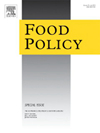Food Policy is a multidisciplinary journal publishing original research and novel evidence on issues in the formulation, implementation, and evaluation of policies for the food sector in developing, transition, and advanced economies.Our main focus is on the economic and social aspect of food policy, and we prioritize empirical studies informing international food policy debates. Provided that articles make a clear and explicit contribution to food policy debates of international interest, we consider papers from any of the social sciences. Papers from other disciplines (e.g., law) will be considered only if they provide a key policy contribution, and are written in a style which is accessible to a social science readership.
《粮食政策》是一份多学科期刊,主要发表有关发展中国家、转型经济体和发达经济体粮食政策的制定、实施和评估等问题的原创研究和新证据。我们的主要关注点是粮食政策的经济和社会方面,我们优先考虑为国际粮食政策辩论提供信息的实证研究。只要文章对国际关注的粮食政策辩论有明确的贡献,我们就考虑任何社会科学的论文。来自其他学科的论文(例如:法律)只有在它们提供关键的政策贡献,并且以社会科学读者容易理解的风格撰写时,才会被考虑。
What explains gender differences in food insecurity
来源期刊:Food PolicyDOI:10.1016/J.FOODPOL.2019.01.003
Can small farms benefit from big companies’ initiatives to promote mechanization in Africa? A case study from Zambia
来源期刊:Food PolicyDOI:10.1016/J.FOODPOL.2019.03.007
Interventions in Agriculture for Nutrition Outcomes: A Systematic Review Focused on South Asia
来源期刊:Food PolicyDOI:10.1016/J.FOODPOL.2018.10.015
Estimating effects of cooperative membership on farmers’ safe production behaviors: Evidence from pig sector in China
来源期刊:Food PolicyDOI:10.1016/J.FOODPOL.2019.01.007
Leveraging agriculture for nutrition in South Asia: What do we know, and what have we learned?
来源期刊:Food PolicyDOI:10.1016/J.FOODPOL.2018.10.012
Consumers’ valuation for food traceability in China: Does trust matter?
来源期刊:Food PolicyDOI:10.1016/j.foodpol.2019.101768
Product recalls, corporate social responsibility, and firm value: Evidence from the Chinese food industry
来源期刊:Food PolicyDOI:10.1016/J.FOODPOL.2018.11.005
Eco-labels and product longevity: The case of whitefish in UK grocery retailing
来源期刊:Food PolicyDOI:10.1016/j.foodpol.2019.101750
Principles of innovation to build nutrition-sensitive food systems in South Asia
来源期刊:Food PolicyDOI:10.1016/J.FOODPOL.2018.10.010
Unravelling the food literacy puzzle: Evidence from Italy
来源期刊:Food PolicyDOI:10.1016/J.FOODPOL.2018.12.004
Agricultural productivity growth in Brazil: Large and small farms excel
来源期刊:Food PolicyDOI:10.1016/J.FOODPOL.2018.03.014
The International Monetary Fund’s interventions in food and agriculture: An analysis of loans and conditions
来源期刊:Food PolicyDOI:10.1016/J.FOODPOL.2019.01.005
Do more bees imply higher fees? Honey bee colony strength as a determinant of almond pollination fees
来源期刊:Food PolicyDOI:10.1016/J.FOODPOL.2018.12.008
Understanding fertilizer adoption and effectiveness on maize in Zambia
来源期刊:Food PolicyDOI:10.1016/j.foodpol.2019.05.004
Food accessibility, diversity of agricultural production and dietary pattern in rural China
来源期刊:Food PolicyDOI:10.1016/J.FOODPOL.2019.03.002
What drives smallholder farmers’ willingness to pay for a new farm technology? Evidence from an experimental auction in Kenya
来源期刊:Food PolicyDOI:10.1016/j.foodpol.2019.03.005
Agricultural Inputs and Nutrition in South Asia
来源期刊:Food PolicyDOI:10.1016/J.FOODPOL.2018.10.011
Are China’s regional agricultural productivities converging: How and why?
来源期刊:Food PolicyDOI:10.1016/J.FOODPOL.2019.05.010
Mandating Front-of-Package Food Labels in the U.S. - What are the First Amendment Obstacles?
来源期刊:Food policyDOI:10.1016/J.FOODPOL.2019.05.005
Long-term crop productivity response and its interaction with cereal markets and energy prices
来源期刊:Food PolicyDOI:10.1016/J.FOODPOL.2018.12.001
Urban food policies in German city regions: An overview of key players and policy instruments
来源期刊:Food PolicyDOI:10.1016/j.foodpol.2019.101782
Promoting rapid and sustained adoption of biofortified crops: What we learned from iron-biofortified bean delivery approaches in Rwanda☆☆☆
来源期刊:Food PolicyDOI:10.1016/j.foodpol.2018.11.003
Does food processing mitigate consumers’ concerns about crops grown with recycled water?
来源期刊:Food PolicyDOI:10.1016/J.FOODPOL.2019.101748
Trade and dietary diversity in Eastern Europe and Central Asia
来源期刊:Food PolicyDOI:10.1016/J.FOODPOL.2019.101767
Advancing a new index for measuring household vulnerability to food insecurity
来源期刊:Food PolicyDOI:10.1016/J.FOODPOL.2019.01.011
Apparent consumption of caloric sweeteners increased after the implementation of NAFTA in Mexico
来源期刊:Food PolicyDOI:10.1016/J.FOODPOL.2019.03.004
Consumer willingness to pay for food safety interventions: The role of message framing and issue involvement
来源期刊:Food PolicyDOI:10.1016/J.FOODPOL.2019.05.009
Determinants of spatial market efficiency of grain markets in Russia
来源期刊:Food PolicyDOI:10.1016/j.foodpol.2019.101769
Alternatives to calorie-based indicators of food security: An application of machine learning methods
来源期刊:Food PolicyDOI:10.1016/J.FOODPOL.2019.03.001
Can food safety shortfalls disrupt ‘Ag for Nutrition’ gains? Evidence from Eid al-Adha
来源期刊:Food PolicyDOI:10.1016/J.FOODPOL.2019.01.002
Cash transfers and nutrition: The role of market isolation after weather shocks
来源期刊:Food PolicyDOI:10.1016/J.FOODPOL.2019.101739
Agricultural technology adoption and household welfare: Measurement and evidence
来源期刊:Food PolicyDOI:10.1016/J.FOODPOL.2019.101742
Addressing food and nutrition security from a human rights-based perspective: A mixed-methods study of NGOs in post-Soviet Armenia and Georgia
来源期刊:Food PolicyDOI:10.1016/J.FOODPOL.2019.02.002
Conditions influencing the adoption of a soda tax for public health: Analysis of the French case (2005–2012)
来源期刊:Food PolicyDOI:10.1016/j.foodpol.2019.101765
The implications of heterogeneous habit in consumer beverage purchases on soda and sin taxes
来源期刊:Food PolicyDOI:10.1016/J.FOODPOL.2019.03.003
Direct intervention or indirect support? The effects of cooperative control measures on farmers’ implementation of quality and safety standards
来源期刊:Food PolicyDOI:10.1016/J.FOODPOL.2019.05.011
Observability of food safety losses in maize: Evidence from Kenya
来源期刊:Food PolicyDOI:10.1016/J.FOODPOL.2020.101895
Investigating menu kilojoule labelling policy adoption from a political science perspective
来源期刊:Food PolicyDOI:10.1016/j.foodpol.2019.101784
Environmentally friendly breeding, spatial heterogeneity and effective carbon offset design in beef cattle
来源期刊:Food PolicyDOI:10.1016/J.FOODPOL.2019.02.001
The long overhang of bad decisions in agro-industrial development: Sugar and tomato paste in Ghana
来源期刊:Food PolicyDOI:10.1016/j.foodpol.2019.101786
Understanding heterogeneity in price changes and firm responses to a national unhealthy food tax in Mexico.
来源期刊:Food policyDOI:10.1016/j.foodpol.2019.101783
The relationship between cottage food laws and business outcomes: A quantitative study of cottage food producers in the United States
来源期刊:Food PolicyDOI:10.1016/J.FOODPOL.2019.01.012
Research priority setting in food and health domain: European stakeholder beliefs about legitimacy criteria and processes
来源期刊:Food PolicyDOI:10.1016/J.FOODPOL.2018.12.005
The system-wide impact of healthy eating: Assessing emissions and economic impacts at the regional level
来源期刊:Food PolicyDOI:10.1016/J.FOODPOL.2019.05.008
Not only speed matters – Crisis response in the hypothetical case of a transport accident involving genetically modified crops
来源期刊:Food PolicyDOI:10.1016/J.FOODPOL.2019.04.006
What is driving increases in dietary quality in the United States
来源期刊:Food PolicyDOI:10.1016/J.FOODPOL.2019.05.003
Post-harvest losses in rural-urban value chains: Evidence from Ethiopia
来源期刊:Food PolicyDOI:10.1016/j.foodpol.2020.101860
Producer group participation in the trade adjustment assistance program for farmers before and after the American Recovery and Reinvestment Act of 2009
来源期刊:Food PolicyDOI:10.1016/J.FOODPOL.2019.05.007
The making of public investments: The role of champions, co-ordination, and characteristics of nutrition programmes in Mozambique
来源期刊:Food PolicyDOI:10.1016/J.FOODPOL.2018.11.001
An unequal burden: Intra-household dimensions of seasonal health in Tanzania
来源期刊:Food PolicyDOI:10.1016/j.foodpol.2019.101766




